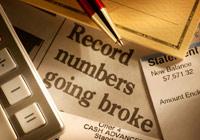By Christopher C. Carr, Esq. Chester County bankruptcy attorney.
Tel: 610-380-7969 Email: cccarresq@aol.com Web: westchesterbankruptcyattorney.org
In my prior article on the topic of post discharge activities, I discuss 11 different areas for your attention. Below, I focus in on just one of these: credit repair.
You have received an Order of Discharge from the Courts. That does not mean that your credit is being properly reported to/by the credit bureaus however. Fixing any errors is up to you. Here are the steps:
- 60-90 days after you receive the discharge, you should call the number provided on the www.annualcreditreport.com site and order your credit reports. (Consumers are entitled to a free credit report every year or when a negative decision is made by a creditor relying on a credit report.) You will see an option to download the report or to view it on the internet. You should request your report be mailed to you by each of the three credit reporting agencies Equifax, Experian, and Transunion. If you are married and filed a joint bankruptcy, both of the spouses must request their own reports. There are many websites that will claim to be “free” but will typically start assessing a monthly fee after a trial period…don’t fall for it: www.annualcredi treport.com is the only such site authorized by federal law to provide truly free reports.
- You will also want to get additional reports from Telecheck, Early Warning Services, and Chexsystem if you have ever had a problem with a checking account or overdrafts. These are the agencies that banks and credit unions rely on when the bank or credit union is making a decision about whether you can open an account with them.
- So, you are now up to six different reports and if married multiply this by 2. However the review you will need to do is actually rather straightforward. Look for a line under each of the creditors that indicates whether a balance is due. That balance should read ZERO (unless it is a debt that is not dischargeable by law, like court ordered support, taxes, criminal fines or penalties). There may or may not be a line saying “Chapter 7 Bankruptcy” or “Chapter 13 Bankruptcy”. These statements refer to the reason why it is no longer a debt.
- If any of your creditors is still listing a balance, then the next step is to dispute the report of that creditor. The Federal Trade Commission offers a sample dispute letter to consumers. [The sample is here. ] You may alternatively use the form supplied with the credit report (usually found near the end of the report.) Also send a copy of the letter to the creditor who is reporting inaccurate information. And please, make and retain in your files two extra copies (one for your file and one for your attorney). Note that if more than one entity is reporting the debt improperly, they each must be notified separately.
- When a consumer disputes a credit report, the agency by law must investigate. The creditor can either verify the accuracy, update or remove the information. The credit reporting agency has deadlines for their response to the consumer. Generally the wrongly reported debt will now be off your report.
- However, if a creditor verifies the report (that is, wrongfully indicates the money is still due and owing), you should seek legal advice promptly. This is likely a violation of the discharge order of the bankruptcy court. There may also be a Fair Credit Reporting Act violation. Your lawyer may suggest a lawsuit against the original creditor, the debt collector (if applicable) and/or the credit reporting agency. . Only a lawyer experienced in these kinds of cases can properly evaluate the situation and provide advice about your options.
- Just to make sure your credit is being reported correctly you may want to order your reports again in a year or whenever you are again eligible for a free report from www.annualcredi treport.com. Repeat the process above as needed.
Summary:
- Order your credit reports 60-80 days after your Order of Discharge
- Order additional reports for problem with checking account or overdrafts
- Carefully review your credit reports
- Dispute any balances that are no longer owed with both the original creditor and the credit reporting agency.
- Review responses promptly
- If the response says you still owe the debt, seek legal advice from an experienced attorney.
- Repeat in a year
Law Offices of Christopher C. Carr, MBA, P.C., is a quality bankruptcy and debt relief practice, located in Valley Township, west of Coatesville, Pennsylvania, where Attorney Christopher Carr, a Chester County bankruptcy attorney, who has over 30 years if diversified ;egal experience, concentrates on serving the residents of and businesses located within Western Chester County and Eastern Lancaster County, Pennsylvania, including the communities in and around Atglen, Bird in Hand, Caln, Christiana, Coatesville, Downingtown, Eagle, Exton, Fallowfield Gap, Honeybrook, Lancaster, Lincoln University, Modena, New Holland, Parkesburg, Paradise, Ronks, Sadsbury, Thorndale, Valley Township, Wagontown & West Chester, Pennsylvania. If you reside or do business in the area and need assistance with a legal issue, please call Mr. Carr at (610)380-7969 or write him at cccarresq@aol.com today!
I also provide HAMP, HAMP2 and other Mortgage Modification Services.
©Christopher C. Carr, Attorney at Law 2009, 2013, All Rights Reserved
